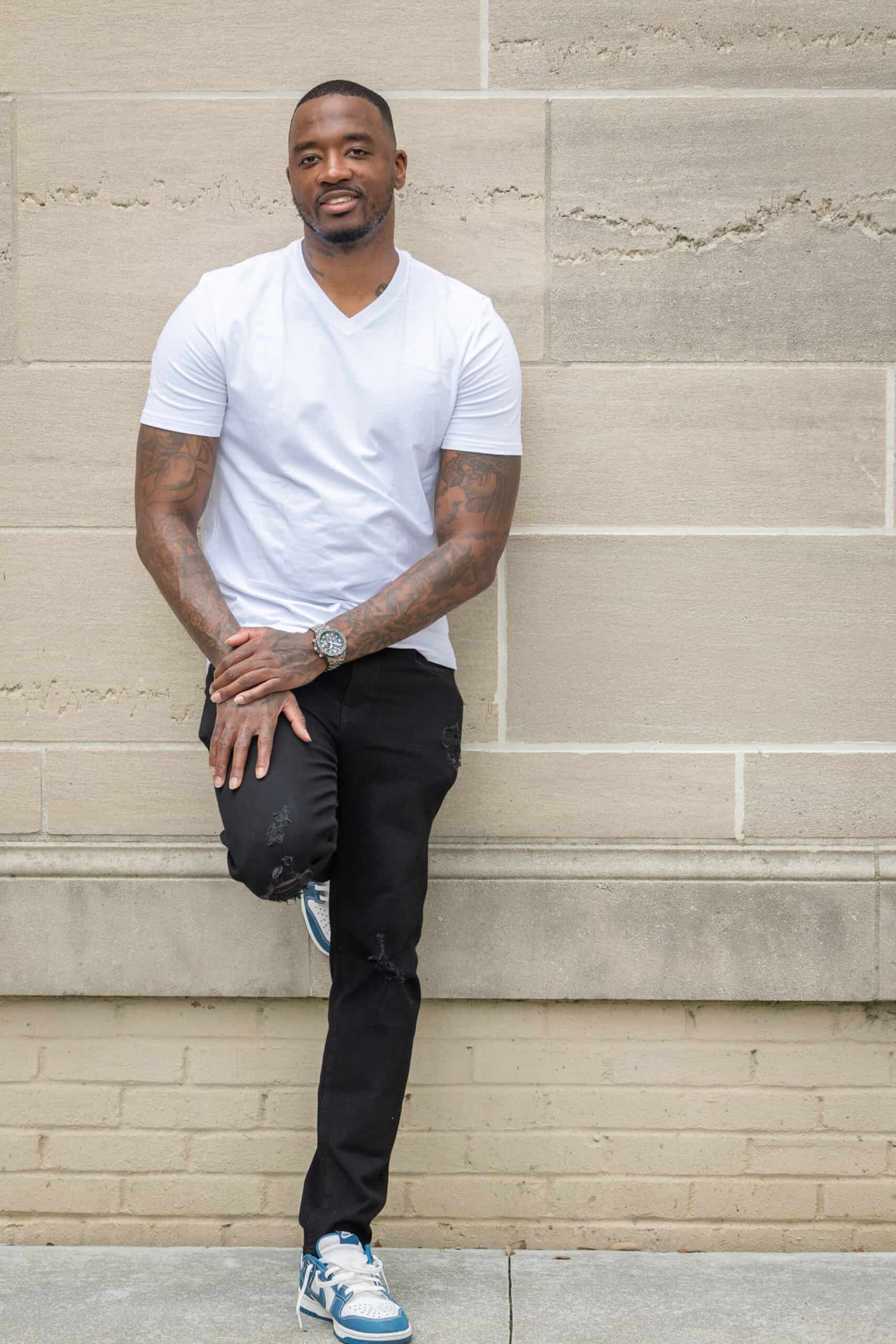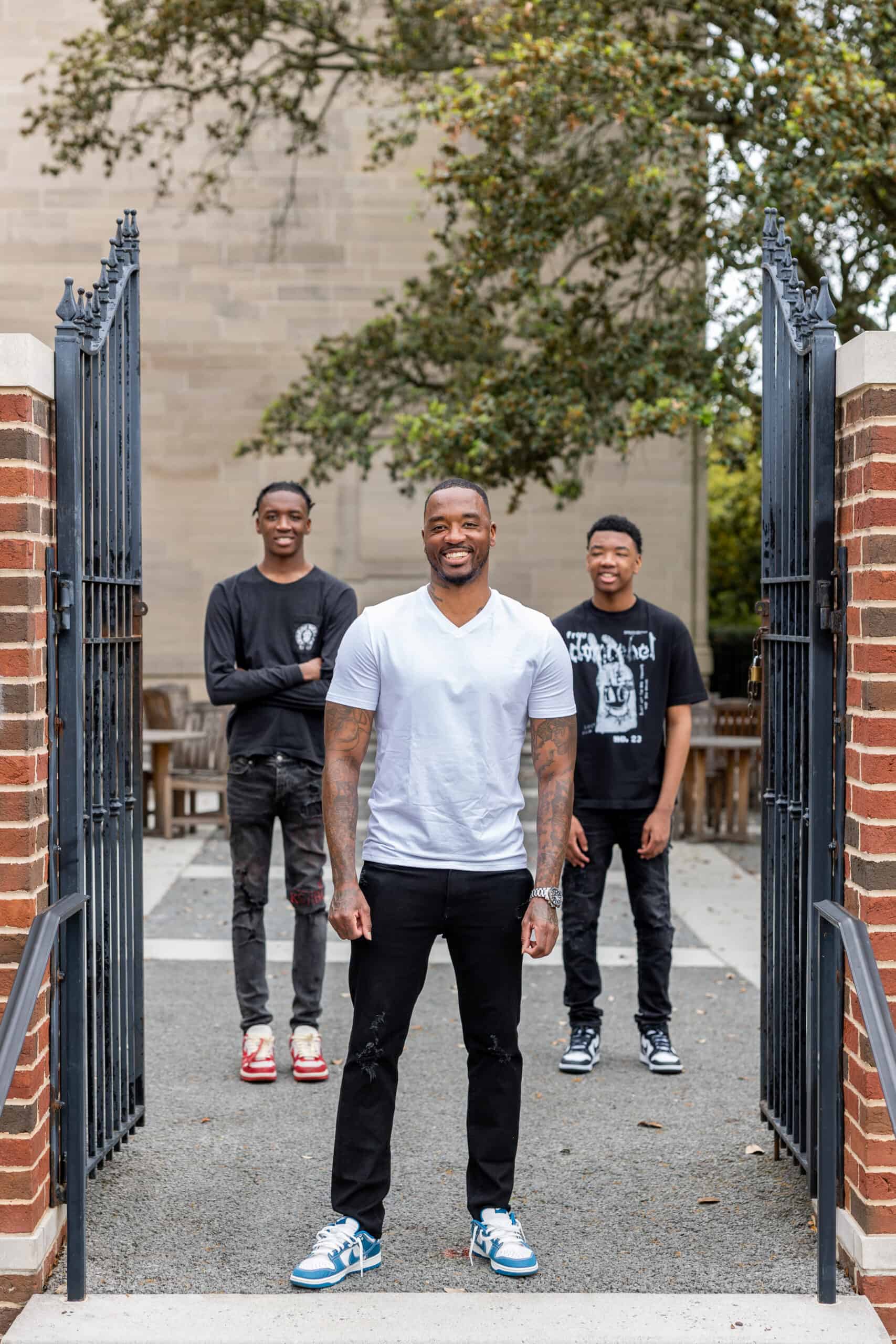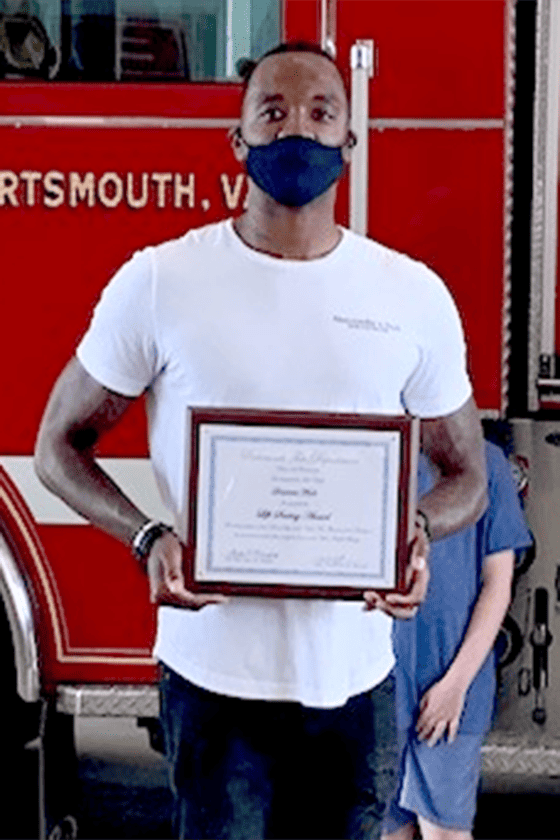-
DEMARCUS' JOURNEY TO TRANSFORMATION
Demarcus thought prison would be a pit stop before getting back to life as he knew it. Instead—thanks to the Prison Fellowship Academy—it was a place of radical change.
By Lou Haviland
Going to prison was considered an initiation into adulthood in the Virginia community Demarcus grew up in. It was expected and accepted.
“A lot of people glorified going to jail,” he says. “It was like a badge of honor, a path of passage. Once you go, you’re solidified.”
An uncle gave 13-year-old Demarcus and his cousins a piece of advice he still hasn’t forgotten: “If you ever go to jail, don’t let anybody punk you. Mind your business.”
His uncle meant that it was important to defend yourself, always stand up for yourself, and not let anyone take advantage of you.
Demarcus would put that counsel to use in a matter of years.
LURED BY FALSE STATUS
While there wasn’t an abundance of material wealth in Demarcus’ early life, what his family had plenty of was affection and caring for one another. He recalls a childhood of riding his bike and climbing trees.
“It was a loving home,” he says. “They always made sure that I had everything I needed. I was blessed to grow up with a great family.”
Demarcus’ grandparents were very active in their church and brought him along as often as possible. He sang in the choir, and his grandmother wrote plays for the church to perform. But even more importantly, they taught Demarcus to pray and to develop a strong inner life with God. He admits that, while God was drawing near to him, he wasn’t ready to draw near to God.
“[My grandparents] showed the way and I followed up, but I didn’t really have an understanding of who God and Jesus were,” he says.
Even though he was rich in his family’s love and attention, Demarcus coveted what many of the young men in his neighborhood had—money, cars, jewelry, and most importantly, respect. He wanted to be looked at with admiration in his community, to have money, and to lift his lower-middle-class family economically. Pulled by an attraction for the streets, Demarcus was determined to be like those young men, ruling the neighborhood by selling drugs.
“The way they walked around, the way they dressed themselves—I wanted that,” he recalls. “When you come from such a small place, you want to be at the top of the food chain.”
WALKING IN THE WRONG PATH
Demarcus began to have regular and frequent run-ins with law enforcement starting at age 11 when he participated in a burglary with a group of friends.
“We were stealing out of the mall one time, and they started chasing us,” he recalls. “A lot of us got away, but one guy got caught.”
Thanks to his friend, the police informed Demarcus’ parents of what he had done. But he and his friends continued committing minor crimes, avoiding any severe punishment since they were juveniles.
By age 14, Demarcus was selling marijuana and developing a steady clientele. Soon he moved on to selling crack cocaine and heroin. The money his “business” brought in was changing how he viewed himself. No longer was he a small fry in the neighborhood. He was gaining the respect and awe of his peers, and it felt good.
“That was the beginning of my lifestyle,” he says. “It began to become a part of my identity, so I began to walk in that path.”

NEW ROLE MODELS
By 2007, Demarcus could no longer fly under the radar. After an attempted robbery that had gone bad, he was sentenced to more than 15 years in prison.
Serving time was not the celebrated pit stop Demarcus had heard so much about. He disliked being labeled a criminal and recalled the values and integrity his family had lovingly poured into his life. Being locked up made him face what he had become.
“I hated prison,” he says. “I hated the belief systems that came along with it. My family taught me respect, manners, and things of that nature, but I was a criminal.”
The life he’d been leading was no longer attractive to Demarcus. He took note of those around him who were flourishing and intentionally choosing to be better individuals.
“When I got to prison, I was 22 and I would always look at the people who were about 35, because I knew that’s around the time I would get out,” he says. “They never knew this, but I would watch them. I wanted to mimic these people because this is who I wanted to be one day—a real man, a mature man.”
Demarcus was honest with God about his behavior and criminal life. He wanted change and knew it could only begin with God.
“I went to God, and it was one of the first times in my life that I let go and I let God,” he says. “I was like, ‘I surrender. I submit.’ And it wasn't because I wanted to go home. That's when I started reading the Bible.”
Daily, he began to build himself up—studying the Bible, exercising, opening up more with family members, and learning as much as he could about running a business to prepare himself for life after release.
“If I could grow every day mentally, physically, emotionally, financially, spiritually, I could see my
progress in life,” he says.
'I went to God, and it was one of the first times in my life that I let go and I let God.'
—Demarcus
GOING WHERE THE GROWTH IS
Demarcus had the opportunity to have a paying job in the prison. But he turned it down because he heard that the first Prison Fellowship Academy® was coming. It was the perfect next step because his mentor and Academy director, Mike “Coach” Dunavant, would be leading the group of men through the yearlong course. That was all Demarcus needed to know.
“We were not getting paid to be with Coach,” he says. “But I knew I’d rather go with Coach because I understood his vision and passion for helping people grow.”
The Academy uses targeted curriculum, compassionate coaches, and the power of community to replace participants’ criminal thinking and behaviors with purpose and biblically based life principles.
“I love Coach, that’s my guy,” Demarcus says. “I went with Coach because I wanted to go where the growth is. I wanted to be the best version of myself that I could be for my family, for society, for everything. [The Academy] was a rigorous program, but I enjoyed it.”
Demarcus was in his Academy site’s first graduating class.
In that year, he gained empathy for others’ points of view and learned to be open, candid, and transparent with others.

BLESSINGS FROM ANGEL TREE
In addition to being part of the Academy, Demarcus also signed up his children for Prison Fellowship Angel Tree®. Angel Tree allows incarcerated men and women to keep a loving connection with their kids through a gift and a personal message.
“The reality is, as a parent when you’re not there to be with your kids, you still want to be the provider for your children,” he says. “At the time I left my children, they were very young. [Angel Tree] was such a blessing.”
Once his kids entered their teen years, Demarcus didn’t sign them up for Angel Tree because he thought they would see it as something for younger children. He was wrong.
“[My kids’ mom] said, ‘Why didn’t you send the Angel Tree? [The kids] loved it. They appreciate it every year, going to those parties and getting those gifts,’” he recalls.
BUILDING POSITIVE CHANGE
Demarcus has realized the goals he hoped for after prison: He’s close to his children, and he’s the owner of a successful commercial cleaning business.
“I don’t want people to look at me as the dude that just did the time,” he says. “I’m an entrepreneur. I add value to life. I add value to communities. I’m here to help build positive change.”
Demarcus proved this shortly after his release from prison in 2020 when he played a key role in getting a driver out of her burning car on the highway. The car was engulfed in flames and appeared to be half of its original size by the time Demarcus reached it.

Using a fire extinguisher from another driver, he settled the flames long enough for two other bystanders to loosen the motorist’s seatbelt and pull her out. Demarcus was awarded a commendation from the local fire department for his heroism.
“It was a blessing to be there,” Demarcus says. “Thankful to be at the right place and able to help.”
He acknowledges he’s not the same man who went to prison in 2007. After his release, he took the bus daily to his job at a tree service company. He keeps one of those bus tickets in his wallet to remember the progress he’s made and God’s faithfulness.
“For me, there have been so many different hurdles and so many challenges, but I have to keep a strong view emotionally, spiritually and mentally. And I can't give up,” he says. “I have to keep going. I thank God for everything. I thank Him every day.”
'I’m an entrepreneur. I add value to life. I add value to communities. I’m here to help build positive change.'
—Demarcus